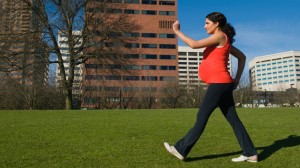It may not be you, but maybe someone you love has just found out that a baby is in the works. Why should you continue with any exercise?
The benefits of fitness during pregnancy include:
- Fewer backaches
- More energy
- Better posture
- Less constipation
- Better sleep
- Stronger muscles
- Better cardiovascular health
- Less risk of diabetes and pregnancy-related hypertension
- Easier breathing
- Faster return to pre-pregnancy body shape
What does pregnancy mean to your exercise routine? Should you continue it? What exercises are safe? Will exercise help with delivery and recovery? Here are a few guidelines to keep in mind to maintain a healthy exercise program and a healthy pregnancy:
- The good news is that active women with normal, low-risk pregnancies do not have to give up their beloved training in order to keep themselves and baby healthy.
- Pregnancy is not the time to begin a strenuous exercise program. Moderation is key.
- This is a good time to keep a journal that records eating, training, workout reports, notes on how you feel, heart rate, recovery, etc.
- If you have any of the following symptoms while exercising, stop and call your doctor:
- The following sports are not considered to be safe as pregnancy exercise – scuba-diving, basketball, soccer or other impact sports, gymnastics, water or downhill skiing or horse-back riding.
- Choose a safe form of exercise for your regular pregnancy exercise such as walking, swimming, low-impact aerobics and water aerobics.

- After the first trimester, do not do pregnancy exercises or positions while lying flat on your back. This compresses blood vessels in your back and can reduce blood flow to the baby.
- If you engaged in a regular exercise routine such as running, cycling or strength training, be sure to check with your doctor if you can continue them while pregnant. In most cases you will be able to.
- Joint Laxity – The body “softens” connective tissue in order to prepare for delivery. Care must be taken in order for joints not to be overstretched. Strong muscles help to hold things together and improve overall stability, so supervised strength training can be helpful as long as care is exercised.
- Resting heart rate increases about 7 beats per minute in the first four weeks of pregnancy and 15-20 beats per minute in mid-pregnancy.
- The safe upper limit for an exercising target heart rate in pregnancy is controversial. Some studies suggest keeping heart rate below 80% of maximum.
- The talk test can also provide a good measure of intensity. It is defined as the intensity where an exercising mother can easily carry on a verbal conversation.
- After giving birth, many women notice problems with mild to moderate urinary incontinence during exertion. Kegel exercises are a must during pregnancy and after delivery.
- Blood volume increased by 40 – 50% during pregnancy.
- An extended cool down is important after exercise to prevent pooling of blood in the legs.
- An average weight increase during pregnancy is 10 – 12 kg., although this can vary. Half of this is the uterus, baby and amniotic fluid, and the other half is body fat stores, fluid and breast fluid.
- vaginal bleeding
- dizziness or feeling faint
- increased shortness of breath
- chest pain
- headache
- muscle weakness
- calf pain or swelling
- uterine contractions
- decreased movement of the baby
- leaking vaginal fluid
There is much more information available about pregnancy and exercise and common sense should be used. A lady’s fitness goals need to take a back seat to that of the developing baby. This is good practise, as once this baby is born, many things need to take a back seat!
**************************************************************************
I got this question recently and thought you might benefit from it:
I’m 43 and just had a baby. I’m exhausted. My baby doesn’t sleep, he’s 5 months old. I am currently nursing. Should I wait to workout or just keep pushing?
Answer: Congrats on your baby! Your number one priority at the moment is your baby, especially since you’re nursing, his nutrition is all up to you. I’m really happy to hear that nursing is working for you.
Clean eating is imperative for you and your son.
As much as I’d like to tell you to workout, I understand your exhaustion. You may start to feel energized if you add even 4 min of intense workouts to your day. For example, this could be in the form of a tabata: 20 sec of jumping jacks, 10 sec of rest for 8 sets.
You’ll find lots of free workouts on my blog or you could try my pal Mike Whitfield’s Workout Finishers (these are only 6 min long workouts that you can use at the end of your workout, but I think you should just try to incorporate one in a day).
Or you may need to wait a little longer. Listen to your body. Remember that your son is an infant for such a short time, but don’t put off starting to move too long. Those short little burst workouts help burn fat but won’t burn you out.
This is just a suggestion, I think it’s a doable way to start to incorporate exercise into a tired mom’s day.
Again, all the best to you, stay in touch.
Shawna




